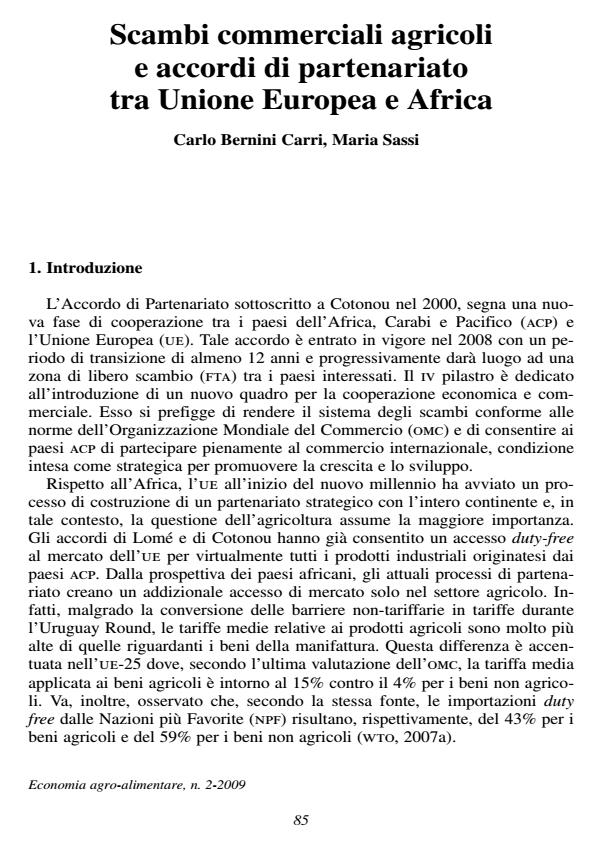Scambi commerciali agricoli e accordi di partenariato tra Unione Europea e Africa
Titolo Rivista ECONOMIA AGRO-ALIMENTARE
Autori/Curatori Carri Carlo Bernini, Marina Sassi
Anno di pubblicazione 2009 Fascicolo 2009/2
Lingua Italiano Numero pagine 19 P. 85-103 Dimensione file 166 KB
DOI 10.3280/ECAG2009-002005
Il DOI è il codice a barre della proprietà intellettuale: per saperne di più
clicca qui
Qui sotto puoi vedere in anteprima la prima pagina di questo articolo.
Se questo articolo ti interessa, lo puoi acquistare (e scaricare in formato pdf) seguendo le facili indicazioni per acquistare il download credit. Acquista Download Credits per scaricare questo Articolo in formato PDF

FrancoAngeli è membro della Publishers International Linking Association, Inc (PILA), associazione indipendente e non profit per facilitare (attraverso i servizi tecnologici implementati da CrossRef.org) l’accesso degli studiosi ai contenuti digitali nelle pubblicazioni professionali e scientifiche.
Agricultural Trade and Partnership Agreements between the EU and Africa - The Cotonou Partnership Agreement, signed on 2000, marks the beginning of a new cooperation phase between acp countries and the eu. The iv pillar of the Agreement, aimed at the creation of a free trade area, concerns the economic and trade cooperation and is targeted to make trade in line with the wto rules and to allow the acp countries a full participation to international trade understood as strategic condition for supporting growth and development. In this context, the trade relationships between the eu and Africa are of specific importance when referred to agricultural products. The liberalization process might have a significant impact for the eu as leading world exporter and importer of agricultural goods and the wider destination and origin market of the African food and agricultural products. On the African side, agricultural export are often the primary source of foreign exchange for food imports required for domestic food security. Furthermore, the new Partnership Agreement creates an additional market access only for the agricultural products that, however, might results strongly constrained by the limited supply potential and high eu sps standards. Thus, the analysis of the costs and benefits connected to the liberalization process in both the eu and Africa is relevant for a better understanding of the forthcoming competitive scenario for the agricultural products. This is the topic of the paper that, with reference to the time period from 1995- 2006, provides a preliminary analysis of the main features of the agricultural trade flows between the eu-25 and Africa; the competitive potential of the sector; the explanatory variables of the African export flows trends to the eu-25. Despite the eu is negotiating an Agreement with the African countries as a whole, the analysis also distinguishes among geographic areas in order to estimate the likely different impact of agricultural trade liberalization. To the same aim food and agricultural product are considered separately.
JEL Codes: Q17 - Agriculture in International Trade
Key words: agricultural trade, trade and development, agricultural competitiveness
- The EU agri-food system in the recent crisis scenarios Carla Zarbà, Gioacchino Pappalardo, Roberta Selvaggi, Biagio Pecorino, in Economia agro-alimentare 3/2024 pp.87
DOI: 10.3280/ecag2023oa15633
Carri Carlo Bernini, Marina Sassi, Scambi commerciali agricoli e accordi di partenariato tra Unione Europea e Africa in "ECONOMIA AGRO-ALIMENTARE" 2/2009, pp 85-103, DOI: 10.3280/ECAG2009-002005